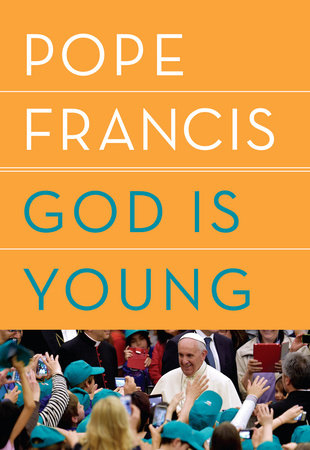

God is Young: Top 10 Favourite Quotes from the New English Translation of Pope Francis' Book
Allyson Kenny
Sunday, September 30, 2018

 The English translation of Pope Francis’ book God Is Young: A Conversation with Thomas Leoncini (Random House, 2018, translation from the original Italian by Anne Milano Appel) will be released on October 2nd, just before the Synod on Youth begins (and by the way, Thomas Leoncini is one of the Synod auditors alongside our very own Emilie Callan and Julian Paparella). I was lucky enough to read the book before its public release.
The English translation of Pope Francis’ book God Is Young: A Conversation with Thomas Leoncini (Random House, 2018, translation from the original Italian by Anne Milano Appel) will be released on October 2nd, just before the Synod on Youth begins (and by the way, Thomas Leoncini is one of the Synod auditors alongside our very own Emilie Callan and Julian Paparella). I was lucky enough to read the book before its public release.
Here are my top 10 favourite quotes:
(Note: All italics are included as they were in the original text.)On Youth’s Best Qualities:
1. A young person stands on two feet as adults do, but unlike the adults whose feet are parallel, he always has one foot forward, ready to set out, to spring ahead. Always racing onward. To talk about young people is to talk about promise and to talk about joy. (p. 4)
On Why God is “Young”:
2. The most distinctive attributes of the young are also His. He is young because He “makes all things new” and loves innovation; because He astonishes and loves astonishment; because He dreams and wants us to dream; because He is strong and enthusiastic; because He forms relationships and asks us to do the same: He is social. (p. 40)
On “Peter-Pan Syndrome”:
3. It seems [in modern culture] that growing up, aging, maturing is bad. It is synonymous with a used-up, dissatisfied life. Today it seems that everything hides behind makeup and a mask. As if the very fact of living did not make sense. Recently I talked about how sad it is for someone to want to have a face-lift of the heart! How sorrowful that someone would want to erase the wrinkles of the many encounters, the many joys and sorrows! Too often there are adults who play at being youthful, who feel the need to put themselves on the level of an adolescent, unable to see that it is a deception. It’s a trick of the Devil. (p. 20)
On Plastic Surgery:
4. I think that young people, both male and female, increasingly resort to plastic surgery mainly to conform to society’s standards and so they won’t end up being discarded; at least they try to prolong the illusion of being protagonists. Unfortunately, until we get over this throwaway culture, the most fragile individuals will continue to delude themselves that a solution can be found in the ephemeral. We must all realize that a society built on the ephemeral and on discarding creates only momentary and illusory pleasure and not deep and lasting joys. (p. 32)
On Gossip:
5. One can speak of a “terrorism of gossip,” because the spread of rumours truly resembles the action of a terrorist: dropping the bomb with his words, he destroys others, then leaves calmly as if nothing had happened. (p. 28)
On Immigrants:
6. Do you know what I think of when I see an immigrant? First of all, I think of my immigrant father. And then I ask myself this question: Why them and not me? And I repeat it again: Why them and not me? Any one of us could be in their situation: We should always put ourselves in someone else’s place, learn to walk in their shoes, think about how it would be if we didn’t even have the money to buy those shoes. (p. 60)
On Dialogue with Atheists:
7. When I was in Krakow for World Youth Day, a young university student asked me: “How can I talk with an atheist who is my age? What can I say to a young atheist who has no relationship with God?” I replied: “Why do you feel the need to talk? We should always do, not just say. If you start talking you’ll be proselytizing and proselytizing means using people. Young people are very sensitive to verbal testimonies; they need men and women who are examples, who do without demanding anything from others, who show themselves for what they are. The other young person will be the one to ask you questions, and that will be the time to talk.” (p. 39)
On Tenacity in Prayer:
8. Intercession is not for wimps. (p. 13)
On Rigid Viewpoints, e.g. Seeing Foreigners or Immigrants as “Evil”:
9. I’m thinking of a number of young priests or students in the seminary. I’ve seen several of them who react to innovation and a valid diversity of views with mental rigidity rather than with wisdom. In my opinion this happens because they are frightened and because they want to force themselves to make a clear choice that will help them construct their own identity – I mean a true, unique identity within the Church ... A person who turns to extremes and tends toward rigidity is a fearful person: He hides behind rigidity as a defense. Behind and under every rigidity there is always an unresolved problem and also, perhaps, an illness. A humble attitude, open to others, the attitude of those who can listen, protects us from rigidity. (p. 58-60)
On Anxiety and Depression in Young People:
10. God wants young people to have a purpose. The cure for anxiety and depression comes from having a mission … The mission of young people is to be prophets and to be prophets they have to “get their feet dirty” in the streets, they have to be among other young people in search of meaning and help them, they have to become bearers of hope and become independent from adults. (p. 66)
Related Articles:
Category: General Posts
Tag: Catholic books, God is Young, Pope Francis, Top 10 Quotes
Pray with the Pope Reflection – June 2025
Friday, June 13, 2025
 Fr. Edmund Lo, SJ
Fr. Edmund Lo, SJ
In this month of June, the Holy Father invites us to pray that the world might grow in compassion, that each one of us might find consolation in a personal relationship with Jesus, and from his Heart, learn to have compassion on the world.
Chaplaincy: “Divine Coffee” for Students
Tuesday, June 10, 2025
 Gianpaolo Capozzi
Gianpaolo Capozzi
Gianpaolo gives us a behind the scenes look at his upcoming Behold segment on the York University Catholic Chaplaincy.
Pope Leo XIV’s homily for Pentecost Sunday 2025
Sunday, June 8, 2025
 Pope Leo XIV
Pope Leo XIV
On Sunday, June 8, 2025, Pope Leo XIV celebrated Mass for the Jubilee of Movements, Associations, and New Communities and spoke about how the Holy Spirit helps the apostles overcome "their fear, shatters their inner chains, heals their wounds, anoints them with strength and grants them the courage to go out to all and to proclaim God’s mighty works."
Homily of Pope Leo XIV at the Mass for the Jubilee of Families, Children, Grandparents, and the Elderly
Sunday, June 1, 2025
 Pope Leo XIV
Pope Leo XIV
Pope Leo XIV celebrated Mass for the Jubilee of Families, Children, Grandparents, and the Elderly and referred to Pope Francis and mentioned spouses who have been beatified and canonized, like the parents of St. Therese of the Child Jesus.
Looking back on Rerum Novarum
Monday, May 26, 2025
 Matthew Neugebauer
Matthew Neugebauer
Pope Leo XIV chose his name primarily to highlight his most recent namesake Leo XIII, whose "historic encyclical Rerum Novarum addressed the social question" to the challenges of his time. What concerns does the encyclical address? How does it speak to its time? And what has been its legacy 134 years later?
SUPPORT LABEL
$50
$100
$150
$250
OTHER AMOUNT
DONATE










